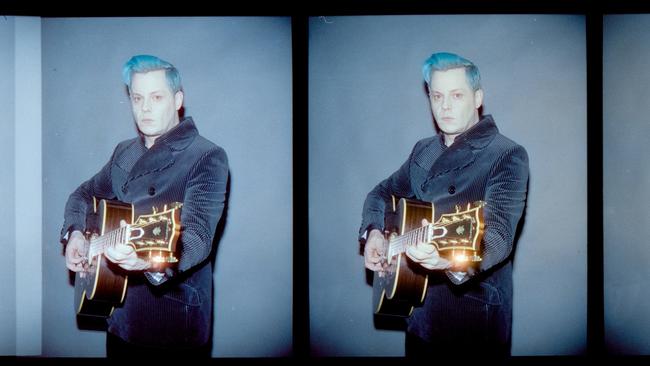Interview: guitar hero and record label boss Jack White on avoiding the easy way out
‘I’ve been a bit obsessed with avoiding things that are easy my whole adult life,’ says the US guitar hero and indie record label boss, who also owns a vinyl pressing plant.

Way back before most people had heard his name or a lick of his music, Jack White sat in a little room and wrote a compelling manifesto for the life cycle of an artistic project, told in a few perfect lines:
Well, you’re in your little room
And you’re working on something good
But if it’s really good
You’re gonna need a bigger room.
And when you’re in the bigger room
You might not know what to do
You might have to think of how you got started
Sitting in your little room.
This nugget of homespun wisdom was delivered in the singer-songwriter’s distinctively Detroit-accented yelp, while his White Stripes bandmate Meg White kept time with a bass drum, closed high-hat and tambourine. Titled Little Room, it was the sixth track on 2001’s White Blood Cells, the duo’s third album and the one that began to lift the two musicians from indie rock obscurity to mainstream fascination.
In short order they went from operating in little rooms to much, much bigger ones. The machinery of the music industry began to attach itself to the ascent of the two Whites, who became unwitting leaders of a media-led rock ’n’ roll revival in the early 2000s, which also swept up fellow US act the Strokes and Australian bands including the Vines and Jet.
The White Stripes gave their last performance in 2009, and while the drummer has stayed determinedly out of public view ever since, the guitarist has maintained a prolific output across all manner of creative outlets.
He has spent most of this year on a world tour, still playing in big rooms, and at major festivals such as Glastonbury: “You’ve been incredible, and I’ve been Jack White,” he said in farewell to a huge crowd there in June, after a barnstorming set at the famed British event.
Amid everything that has happened since he wrote Little Room, does that song still hold a special meaning for him all these years later?
“Yeah, I come back to it all the time,” White, 47, tells Review. “I think that’s why I make things difficult on myself, in a lot of ways. It’s a way of keeping focus on not getting too satisfied, too distracted; you have to keep putting yourself back in that zone [of] why you first started doing it.
“It’s very easy to forget because there’s always people around you trying to make things easier, and it’s very tempting to take them up on that all the time, and take the nicer treatment, and the nicer way of getting out of any labour-saving stuff – but really, the labour is important. And so in that little room, you’re really working; it’s the longwinded way of saying, ‘You’ve got to remember where you came from.’ ”
Not so long-winded, perhaps; Little Room, after all, runs less than a minute, among the many hours of material he has written, recorded and sent out into the world since 2001. With a laugh, White replies, “My explanation was longer than the song.”
Few musicians have done more to champion the electric guitar this century than White, whose ominous seven-note descending riff from the 2003 single Seven Nation Army – first performed during a sound check at the Corner Hotel in Melbourne – is an indelible contribution to popular music.
The last person to give the instrument such a visceral, culture-shaking thrash was Tom Morello, Rage Against the Machine’s six-string maestro, another American genius who took a twisted pleasure in extending our collective understanding of how the guitar can sound when placed in the hands of a true innovator.
First with the White Stripes, then into the Saboteurs and his solo career from 2012, White has become an accidental guitar hero – accidental because as a boy he was chiefly fascinated by the drums, so much so that he removed the bed from his childhood bedroom to fit two drum kits in there and opted to sleep on the ground.
“I love that instrument, I know it really well and I want to do it,” White told Review in 2019. “I don’t think I’m an amazing drummer or anything, but I do feel comfortable. When I’ve got a guitar on, I feel uncomfortable, and maybe if anything good comes out of it, it’s because of that. It doesn’t feel like an extension of me, it feels like a lot of hard work – whereas the drums feel like they flow easily from me.”

Consequently, White has always considered himself a drummer foremost. (He formed another rock band named the Dead Weather in 2009, in which he plays drums and sings.) Yet as far as the average music fan is concerned, a guitarist is what he is and perhaps will always be.
As a measure of his stature and esteem, take Coachella, the US festival that has become one of the biggest annual spectacles for the global music industry, as it’s live-streamed to millions online on top of the 100,000 or so who attend the event in person. In 2015, White headlined the main stage on Saturday night, wedged between AC/DC (Friday) and Drake (Sunday); since then, only a handful of guitar-centric acts – Guns N’ Roses, Radiohead, Tame Impala – have achieved Coachella headliner status.
Reminded of the above quote from three years before – and an additional quip that playing the guitar is a struggle and that he “hopes it stays that way forever” – White chuckles and says, “When there’s moments where it feels like it’s becoming comfortable or becoming easy again, I like to shake it up for myself and try to make it a little bit more difficult. I think I’ve been a bit obsessed with that my whole adult life: avoiding things that are easy.”
This has been a very good year to be a Jack White fan, for the man has issued his fourth and fifth solo albums. They are two sets of vastly different moods and sonics; as the composer tells it, Fear of the Dawn is the Saturday night record, and Entering Heaven Alive is its Sunday morning accompaniment.
To Review’s ears, the former is one of the year’s best albums and a collection that will get anyone who has ever played air guitar to one of White’s mighty riffs on their feet and cheering. On its 12 tracks the artist explores some of his darkest musical impulses to create a work shot through with big-beat groove, driving bass, vocal wrath and all manner of demented and surprising guitar tones, as if he had daisy-chained a series of his most exotic effects pedals together to create a kaleidoscope of hair-raising rock ’n’ roll.
“When I’m attacking a song, I’m always trying to do something I hadn’t done before or [to see] if I can pull something out of me that’s unique for that particular song,” he says. “It can be tough; there’s only so many notes and I didn’t take lessons, I taught myself. What’s interesting is people who can do something with the instrument that can make you wonder, ‘Wow, how did they make that sound?’
“I felt that way in high school with Tom Morello: I didn’t know how he was making the sounds he was making, and that was inspiring,” says White.
“Same thing with Jeff Beck: to this day, Jeff Beck is getting better and better as a guitar player, and that’s really hard to do. I find that kind of stuff inspiring. You try your best not to do the same thing over and over again. You might at times fall into traps, and you do; sometimes it just can’t be helped. But if you at least try to get to new ground, usually something interesting will happen.”
Multi-tracked and finessed on digital recording equipment for only the second time in the famously analog-obsessed musician’s career, Fear of the Dawn bursts from the speakers with a vitality that often surprises, most notably on fourth track Hi-De-Ho, a genre-hopping cut that features guest vocals by acclaimed US rapper Q-Tip.
That stirring 40-minute effort – on which White wrote, performed and recorded almost every instrument – would have been plenty enough on its own, and the basis for the usual year or two of touring before returning to the drawing board. But the hangover of worthy songs stockpiled during the pandemic meant White had a whole other album of quieter, acoustic guitar-based material ready to go, too. Rather than wait, he opted to release Entering Heaven Alive just three months later, in July.

In effect, White has flooded the market: all up, 23 new compositions are in the atmosphere and plenty of them have been aired during his Supply Chain Issues world tour.
More than just a cute name, the title astutely points to the pinch being felt by the recorded sector – it’s said to be a minimum 10-month wait for any artist to receive finished vinyl pressings, for instance – and the live music industry, where skilled labour and essential production equipment are scarce and in high demand due to Covid’s ripple effects.
Accompanied by a red-hot band in bassist Dominic Davis, drummer Daru Jones and keyboardist Quincy McCrary, White’s extensive run will near its end this month with one show each in Australia – at the debut Harvest Rock festival in Adelaide – and New Zealand.

When Review connects with White in mid-October, he is midway through a run of South American concerts with US rock band Pixies, where he understandably has been leaning towards more of the “Saturday night” material than the quieter acoustic numbers.
Yet for every show with his band, White opts to walk out without a set list. It’s not quite as risky as a tightrope walker working at heights without a safety net hung beneath them – these are highly adept and intuitive musicians, after all – but there are precious few big-name rock acts today who allow such a dramatic degree of uncertainty on stage. For the band leader, what’s the attraction of such an approach?
“I think the band and I would be bored if we started playing things exactly the same way every time, in a kind of perfunctory way,” he replies. “That would be more about doing things the easier way, rather than the difficult way, and I guess I’m just not wired that way. It would start feeling like phoning it in, especially after 90 shows [this year]. I can’t even imagine doing 10 like that and not wanting to quit; it would just feel so lifeless to me.
“When a show begins, none of us knows what’s going to happen. It could be great or it could be boring; we’ll see what happens. But if the crowd keeps feeding it and pushing, usually it just gets better and better and better because there’s this inspiration and electricity coming at you. That’s what I’m looking for.”
Think horses, not zebras, when you hear the sound
Of hooves on the ground…
This unusually arresting line would give you pause if you heard it the course of ordinary conversation, let alone in the context of a rock song. It catches the ear, sticks in the mind and prompts one to search for an answer to its origins, and how it ended up on Fear of the Dawn’s closing track.
“I was reading an article about how doctors differentiate between different but similar symptoms; to be topical, symptoms of Covid might be the same as the flu, for example,” he replies. “But I like that doctors encourage people not to think they have an exotic thing: just because you have this mark on your arm doesn’t mean you have Ebola. It might mean you have acne.”
Coined in the 1940s by American professor Theodore Woodward, this aphorism has since become drilled into generations of medical students in an attempt to avoid unnecessary diagnoses of rare diseases. White found it, dressed it up and put it in his art; now you know about it, too.
The line appears in Shedding My Velvet, another unusually titled song that provokes curiosity. The image of the hooves applies here, too, for the title is what a male deer does in the process of revealing its new antlers, as the skin-like velvet falls away to show off the hardened bone structure beneath. (“Sometimes I just write these phrases down, just in case,” he says. “It’s like I’m sending myself a little time capsule; it’s a way of helping my future self out, I guess.”)

As is hopefully apparent to you by now, White’s world is a deep well of thoughtfully curated, designed and composed art. (As a sports fan, he also co-owns a baseball bat company in Texas called Warstic.) But it doesn’t stop with words and music: as an extension of his core tenet to avoid the easier path, he has opted to extend himself well beyond the creative process into the realms of production and manufacturing, too.
In Detroit, he owns and operates Third Man, a combined record store, record label, recording studio, mastering facility and vinyl pressing plant. It was one of less than 10 working plants in the entire US when it opened in 2017, and it’s now capable of producing about 5000 records a day.
While promoting his two album releases this year, White has made a point of calling on the three major record labels – Universal, Sony and Warner – to reinvest in the pressing plant hardware they once owned, to help reduce the 10-month global delays that currently affect all vinyl releases, from pop juggernaut Taylor Swift and co to little-known indie acts.
In effect, this rock star has become a one-man army leading the charge for vinyl’s resurgence in popularity among listeners and collectors. He has staked his wealth, influence and reputation on it, and he has reinvested what he has earned from his creative output into making meaningful things, not just more songs to stream from your phone.
None of it would have happened if he hadn’t started in that little room, and what’s perhaps most impressive about his contribution to popular music is that he has attempted to keep that “keep it small” ethos in mind even as the rooms have got bigger.
“On many of the tracks on [the two new albums], I played all the instruments myself, and recorded in my studio in my backyard with an engineer,” he says, sounding chuffed. “That’s very, very DIY. And then those records ended up being pressed in my own pressing plant; the artwork [was] worked on in my art department, and the records [were] mastered in my mastering studio.
“I mean, they’re all happening in my house. I think I’m the only person doing that; maybe the first person to ever do all those components, from soup to nuts, as they say. I wasn’t setting out to do that, but I find inspiration along the way, all the time, with that.
“I’m not trying to brag about that,” he adds. “I’m just saying that it just shows that these things are important to me and how I do things. It wasn’t about control; it was about working within this hive, within this room, with these other folks: ‘Help me make this exist, guys.’ We team up and we do it – but it’s still my house, so I can still call it my ‘little room’.”
Jack White performs a one-off Australian show at Harvest Rock, a new festival to be held in Adelaide, on November 19-20. Fear of the Dawn and Entering Heaven Alive are out now via Third Man Records.


To join the conversation, please log in. Don't have an account? Register
Join the conversation, you are commenting as Logout